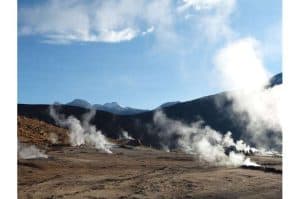
A University of Canterbury (UC) Ph.D. student has identified a renewable and affordable energy source with the ability to remove carbon dioxide ( CO2) from the atmosphere.
The research, from UC Civil and Natural Resources Engineering Ph.D. student Karan Titus, investigates taking hot water from geothermal reservoirs and burning forestry waste to superheat it—generating electricity. The geothermal water is then injected back underground along with the CO2 produced from the burning wood.
Karan says the process, known as Geothermal-Bioenergy and Carbon Capture and Sequestration, or BECCS, has significant benefits. “We are creating more clean, renewable energy, while indirectly removing CO2 from the atmosphere—Geothermal-BECCS plants could store 1 million tons of usable CO2 each year in underground geothermal reservoirs.
“We can also generate significantly more renewable energy using this process when compared to traditional geothermal power. The BECCS system is also more cost-effective per ton of CO2 than other common climate change mitigation strategies due to decarbonization on two fronts: more renewable power and the secure storage of CO2.”
The process of directly separating CO2 from the air and storing it in geothermal reservoirs is currently used in Iceland but is not yet used in Aotearoa New Zealand. Karan’s research is the first to explore pairing CO2 with injection to boost geothermal energy production, which is created by burning biomass; a forestry by-product that includes slash, which caused widespread damage following Cyclone Gabrielle.
UC Engineering senior lecturers Dr. Rebecca Peer and Dr. David Dempsey are supervising Karan’s research. Dr. Peer believes this kind of innovative thinking is what we need to tackle the issue of decarbonization at scale.
“A carbon-negative energy cycle would be very valuable to Aotearoa’s long-term energy and sustainability goals. It is exciting to be a part of research at UC tackling a global issue like climate change with potential solutions that leverage our Indigenous resources and provide a pathway to address national issues such as forestry slash,” she says.
Dr. Dempsey believes Karan’s research addresses the affordability of climate change action—one of the key challenges facing Aotearoa New Zealand’s goal to achieve net-zero emissions by 2050.
“A major problem facing Aotearoa as we try to decarbonize our economy is how we can retain our standard of living, while cutting our fossil-fuel emissions, but without bankrupting the country,” Dr. Dempsey says.
Karan, who aims to graduate in mid-2024, says his interest in this area stems from his childhood.
“From when I was a child and watched An Inconvenient Truth’, climate change has always been on my mind. Hearing back then that excessive emissions will result in extreme weather events—such as droughts, wildfires, brutal hurricanes, and immense floods—and seeing that happen now, makes me want to do something to help protect people, animals and the environment,” he explains.
“This is my way of contributing at a local level. No single solution will save us; we need to be fast-acting to find the best fit solution for our community without wasting any more decades.”
